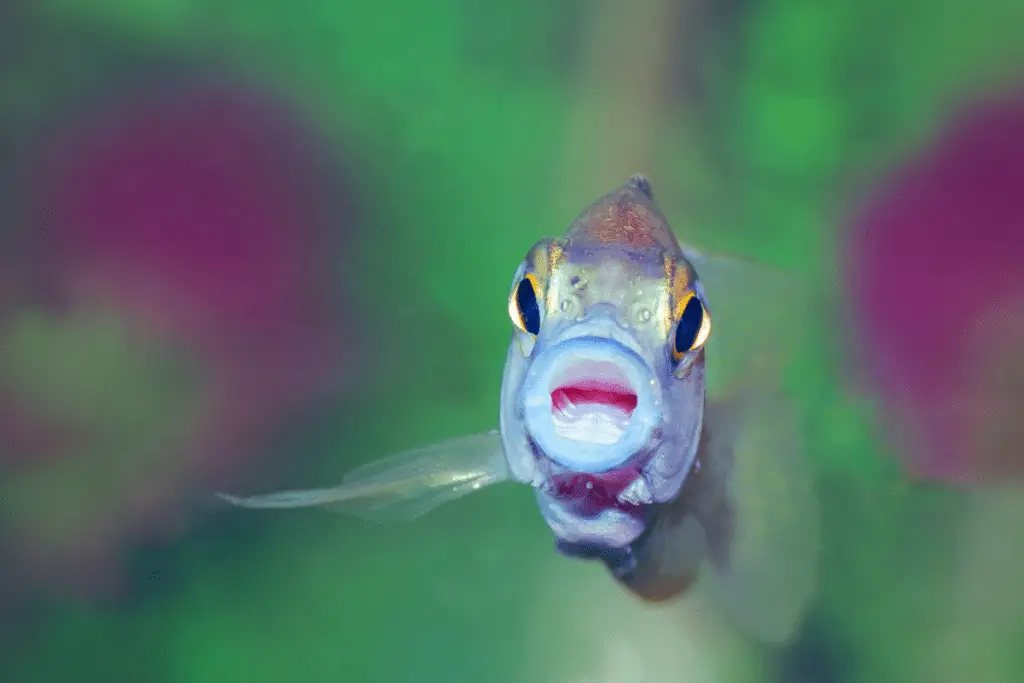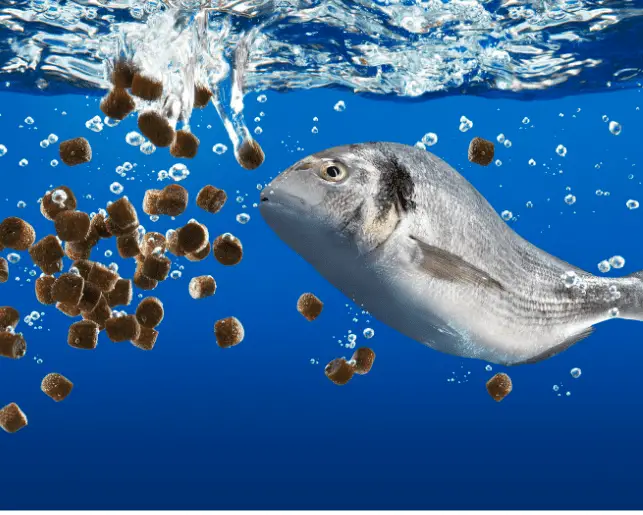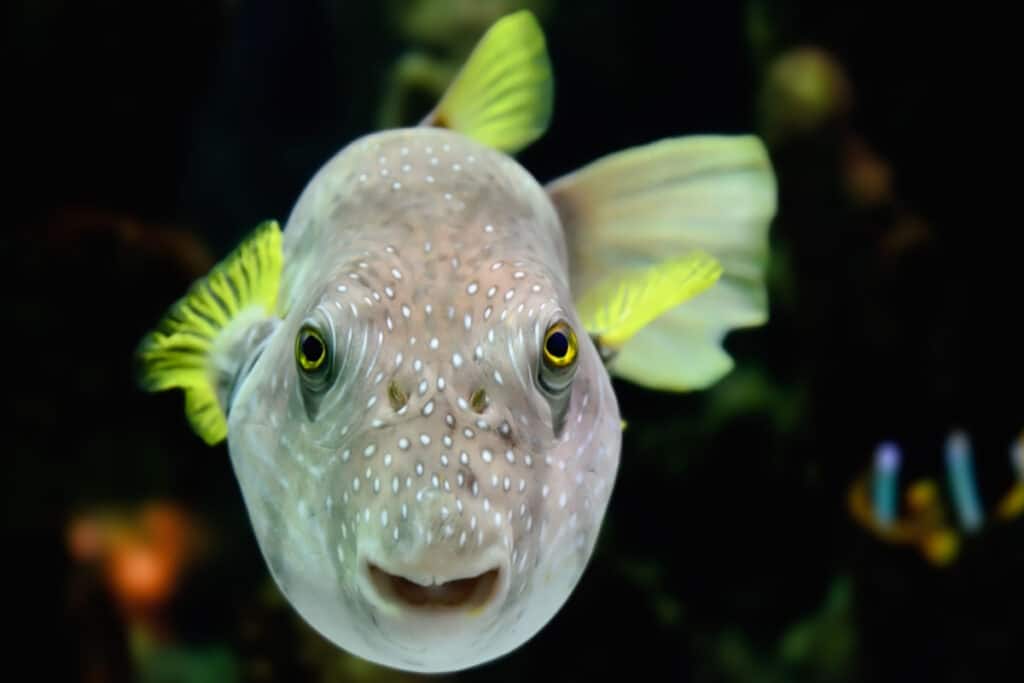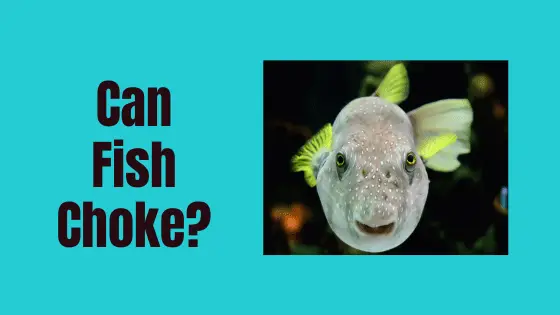If you have invested in a tropical freshwater setup, I’m sure you will be excited to watch your little guys in their aquatic environment. Becoming a fish parent makes you always on the lookout for any strange behaviour or signs of distress.
Have you, like myself, ever wondered if fish can choke?
Due to their physical make-up, fish cannot choke or gag as humans do. However, a fish can starve or asphyxiate if an object gets lodged in its throat or if the tank water lacks enough oxygen. Oesophageal blockages can cause both starvation and suffocation in fish.
Now, I’m quite certain you’d like to avoid or at least limit the chances of any of these things happening. Whatever fish you keep, there are precautions you can take to prevent your fish from getting a blocked esophagus, starving, or suffocating and ways that you can help your fish in such predicaments.

What Happens When A Fish Chokes?
When a person chokes, it is usually because something other than air has gone down their trachea (the airway used for breathing) instead of going down the esophagus (used for eating). A person with an obstructed airway will gasp and gag, choking for breath.
Fish have gills on their heads instead of having a trachea next to their esophagus. For a fish to breathe, they swallow water, which exits through their gills. Oxygen is removed from the water in the gills, oxygenating the fish. If there is an obstruction in their esophagus where water can’t pass through to the gills, and they start to suffocate.
If the obstruction isn’t big enough to block water flow to the gills but is big enough to obstruct new food eaten, the fish can breathe but will eventually starve.
Can Fish Choke On Food?
Fish can “choke” on their food, especially if they try to eat something too big for their narrow esophagus. If an object is too hard, doesn’t dissolve, or gets softer with water, the blockage could become detrimental to the fish’s health.
Live food like earthworms, crickets, other fish, and shrimp can be problematic if they are too big. Despite crab and shrimp pieces being a yummy treat, it is a good idea to remove the small sections of shells of the crustaceans, as the sharp parts can become lodged in the esophagus of a fish, especially if they go down the wrong way.
An earthworm that is too long can be hazardous for a fish too. If you have ever choked on a piece of sinewy meat, you might get an idea of what it would be like for a fish to have a long earthworm in its belly, throat, mouth, and mouth outside its body simultaneously.
Crickets are a yummy treat for some fish, but they have spikes on their legs and a hard exoskeleton. These hard and spiky parts can get stuck sideways in the esophagus of a fish, depending on the size of the fish and the cricket.
Predatory fish will often eat their prey head-first due to the sharp fins of some feeder fish. If the feeder fish is too big, the spiky fins can hook inside the mouth, causing an inability to spit or gag out the meal. The predatory fish starves (and maybe suffocates) as a result. It’s a fish-eat-fish world.
Some fresh or frozen fish food comes in chunky blends, giving options for the differently-sized fish in your tank. For the most part, fish will peck and nibble at these chunks and morsels, and rarely will they choke on their food. However, you might have the odd fish whose eyes are bigger than its stomach, and it bites off more than it can swallow, much like some humans.
Fish pellets or flakes come in various sizes and are made of different ingredients. These become soft and eventually disintegrate in water if they haven’t been eaten. You should choose the fish food according to the size of your fish and the quality of the food, and monitor the portions you feed to prevent overfeeding and choking.

What Else Can Fish Choke On?
While biding its time between feeding times, your tropical fish may nibble on non-food things that can cause a blockage. For example, many fish enjoy sucking in the sand or gravel at the bottom of a fish tank, searching for little morsels to eat. However, several swallowed pebbles or a too large pebble can cause a blockage in a fish’s esophagus and stomach.
Fish can also choke on loose pieces of plastic, for example, fake seaweed or tank decorations. A fish will choke and gasp for air if it has damaged gills or if the water is not oxygen-rich. Some causes for water not carrying enough oxygen include too many live plants and overpopulated tanks.
Betta fish cannot get all their oxygen from water to breathe as they are obligate fish, meaning they have to get oxygen from the air too. An obstruction in their mouth would most certainly pose a problem for them, as they would not be able to breathe when they come to the surface.
Some fish have adaptations that can prevent them from choking, such as those with pharyngeal teeth, those with external gills, and those who can breathe through their skin.
Pharyngeal teeth help to pull food items from the fish’s mouth to its gut, most helpful if something gets lodged in the wrong place. External gills can presumably function without the movements of the fish’s mouth, so fishes fitted with this adaptation, plus the lucky fishes which can breathe through their skin, only need to worry about starving to death in the case of an obstruction in their mouths.
How Do I Know If My Fish Is Choking?
If your fish is displaying some out-of-character behavior, it might be choking. Some signs of fish choking, suggested by the comments in this link, include the following:
- The fish looks like it is breathing heavier and comes to the surface for air.
- The fish looks lethargic.
- The fish’s gills are flared.
- The fish is opening its mouth wider than usual.
- Food might be sticking out of the fish’s mouth.
- The fish may swim awkwardly, moving its pectoral fins around and swimming backward.
- Red streaks start to form on the fish.
What Do You Do If Your Fish Is Choking?
Firstly, don’t panic. Your fish needs you to be level-headed because you’ll need to work carefully and relatively quickly. Suppose it is obvious that there is an obstruction in your fish’s mouth. In that case, it will require you to remove the fish from the water, hold it carefully, and remove the offending object with tweezers or a small net before releasing it back into the tank.
If your fish appears to be gagging but has no obstruction in its esophagus, it might be due to poorly oxygenated water or the wrong type of water altogether, e.g. saltwater vs. freshwater. You can do a water change, or carefully transfer the fish to another tank, then assess and remedy the water problem.

Conclusion
Physiologically, a fish cannot choke, but it can asphyxiate or starve, especially if there is an obstruction in its oesophagus. By taking some preventative measures, knowing the signs, and knowing what to do when your fish is choking, you can responsibly care for your fish and prevent it from the misfortune of choking.

